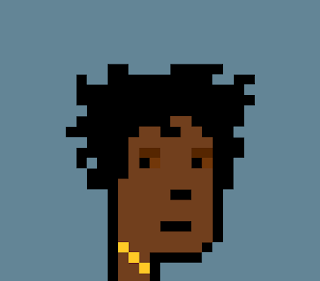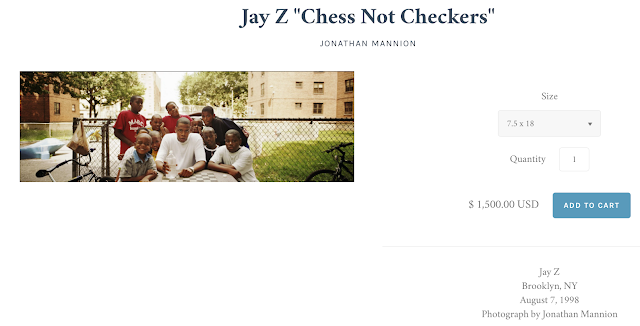 |
| Larva Labs' CryptoPunk 6095 |
In June, hip-hop icon, Shawn Carter b.k.a Jay-Z, accelerated his entrance into the NFT (non-fungible token) space with a splash: changing his Twitter and OpenSea avatars to CryptoPunk #6095, discussing NFTs as a revenue stream for musicians on Twitter Spaces, and dropping an NFT of the Reasonable Doubt album art at Sotheby's. Jay-Z owns "shawncarter.eth" and "hov.eth", plus his newly verified OpenSea account has 71 NFTs. Whether this is a genius marketing move or clapback to debut before Damon Dash leaked something, it further pushes NFTs into the mainstream spotlight.
So, where did this all originate? Before the pixelated flex and NFT fandom, Jay-Z filed two intellectual property-related lawsuits in New York and California. The first, a copyright infringement suit blocking Roc-a-Fella Records co-founder, Damon Dash, from selling an NFT of Jay's debut album, Reasonable Doubt. The second is a name, image, and likeness (NIL) case against photographer, Jonathan Mannion.
Damon Dash, one-third owner of Roc-a-Fella, teamed up with NFT platform, SuperFarm, to sell his one-third copyright ownership of Reasonable Doubt as an NFT. The auction was supposed to happen in late-June and transfer to the buyer Dash's right to all future revenue generated by the album. Jay-Z filed a lawsuit to stop the drop, stating that rights to the album belong to Roc-a-Fella Records. A judge ruled in favor of the record label and prohibited Dash from minting and selling Reasonable Doubt as a NFT.
Just because Damon Dash is a co-owner of the record label, doesn't mean that he owns the label's assets. As legal persons, corporations can own assets, an individual shareholder can't sell or transfer those assets at their own discretion. As expressed in the lawsuit, Roc-a-Fella Records, Inc. is the sole copyright holder of the 1996 album.
The second lawsuit is aimed at Jay-Z's former photographer who was hired to take pics of the rapper in the mid-1990s. Jonathan Mannion is the photographer behind the iconic Reasonable Doubt album cover. Mannion is a well-known music photographer whose photographed Notorious B.I.G., Drake, Snoop Dogg, DMX, Lil' Wayne, and more. Mannion sells some of these images on his website. The lawsuit states that Jay-Z never gave permission for Mannion to resell photographs. Filed in California, the action alleges that Mannion is “misappropriating and using for commercial purposes Jay-Z’s name, likeness, identity, and persona” and violating California's common law on rights of publicity. Rights of publicity are a person's right to financially benefit from their own likeness.
Under U.S. copyright law, the person that snaps the photos is the owner of the copyright for that image. As the copyright holder, the photographer has the right to create derivative works of the photograph, as Mannion has done on his website with slipmats. The photographer also has the right to reproduce and sell the photos that he shot. Despite Mannion owning the copyright of the images, it doesn't mean that he can make money off of another person's face; Jay-Z has rights of publicity. Mannion's best defense could be the artistic expression doctrine under the First Amendment, which gives individuals the right of self-expression through art. Does the photographer, hold himself out to be an artist and display his photography in art galleries?
Mannion is not only the photographer behind Reasonable Doubt, but he also shot album covers for Jay-Z's The Blueprint, The Black Album, Hard Knock Life, Vol. 3, and others. Perhaps, at some point in the past, Jay-Z and Mannion had an arrangement, did Mannion get a license to monetize the photographs?
Both cases are still ongoing, Jay-Z's complaint in the Mannion case has yet to receive a response, and Damon Dash is now fighting to remove Jay-Z's lawyer from the case and for his right to sell his ownership stake in Roc-a-Fella Records. And that, Sotheby's Reasonable Doubt NFT, it sold for $139,000.
What's the lesson for artists? Know the actual legal rights you possess before selling an NFT that was co-created with another or depicts the likeness of another.
The contents of this blog are for informational purposes only and may not be relied on as legal advice.

No comments:
Post a Comment